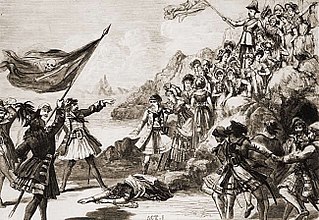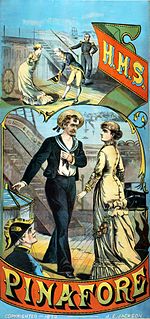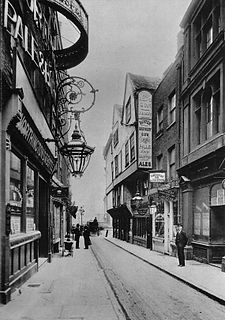
The Pirates of Penzance; or, The Slave of Duty is a comic opera in two acts, with music by Arthur Sullivan and libretto by W. S. Gilbert. The opera's official premiere was at the Fifth Avenue Theatre in New York City on 31 December 1879, where the show was well received by both audiences and critics. Its London debut was on 3 April 1880, at the Opera Comique, where it ran for 363 performances.

H.M.S. Pinafore; or, The Lass That Loved a Sailor is a comic opera in two acts, with music by Arthur Sullivan and a libretto by W. S. Gilbert. It opened at the Opera Comique in London, on 25 May 1878 and ran for 571 performances, which was the second-longest run of any musical theatre piece up to that time. H.M.S. Pinafore was Gilbert and Sullivan's fourth operatic collaboration and their first international sensation.

Anthony Warlow is an Australian opera and musical theatre performer, noted for his character acting and considerable vocal range. He is a classically trained lyric baritone and made his debut with the Australian Opera in 1980.

The Opera Comique was a 19th-century theatre constructed in Westminster, London, between Wych Street, Holywell Street and the Strand. It opened in 1870 and was demolished in 1902, to make way for the construction of the Aldwych and Kingsway.

Harold Fraser, known professionally as Snub Pollard, was an Australian-born vaudevillian, who became a silent film comedian in Hollywood, popular in the 1920s.

Daphne Pollard was an Australian-born vaudeville performer and dancer, active on stage and later in US films, mostly short comedies.

The D'Oyly Carte Opera Company is a professional British light opera company that, from the 1870s until 1982, staged Gilbert and Sullivan's Savoy operas nearly year-round in the UK and sometimes toured in Europe, North America and elsewhere. The company was revived for short seasons and tours from 1988 to 2003, and with Scottish Opera it later co-produced two productions.

Sydney Granville was an English singer and actor, best known for his performances in the Savoy Operas with the D'Oyly Carte Opera Company.

James Cassius Williamson was an American actor and later Australia's foremost impresario, founding J. C. Williamson Ltd.

Alfred John "Alf" Goulding was an Australian-born vaudevillian, who became an American film director and screenwriter. He directed 182 films between 1917 and 1959 and is credited with having Harold Lloyd wear his trademark glasses.
Lamplighters Music Theatre is a semi-professional musical theatre company based in San Francisco, California. Founded in 1952 by Orva Hoskinson and Ann Pool MacNab, the Lamplighters specialize in light opera, particularly the works of Gilbert and Sullivan, as well as such works as The Merry Widow, Die Fledermaus, Of Thee I Sing, My Fair Lady, Candide, and A Little Night Music.

Jessie Bartlett Davis was an American operatic singer and actress from Morris, Illinois, who was billed as "America's Representative Contralto".
Alice May, sometimes known as Louise Allen, was an English singer and actress, best remembered as the creator of the soprano role of Aline in Gilbert and Sullivan's The Sorcerer (1877).

Pauline Joran was an American-born opera singer and violinist, whose career took place mostly in the UK. She was the wife of William Ernest Bush, the first and last Baron de Bush, and mother of Paulise de Bush, the "Baby Baroness". She is remembered for creating the role of Saida in Arthur Sullivan's 1898 Savoy opera The Beauty Stone.
May Beatty was a New Zealand singer and stage and screen actress. She was born in Christchurch, New Zealand on 4 June 1880.
The Toronto Light Opera Association was an opera company based in Toronto, Ontario, Canada that specialized in performing the works of Gilbert and Sullivan. It was founded in 1940 and disbanded in 1955.
Edward Joseph McNamara was an Australian born vaudevillian who made a career on stage in Australia, the US and in Hollywood silent films, before dying suddenly in 1928.

Alice Oates was an actress, theatre manager and pioneer of American musical theatre who took opéra bouffe in English to all corners of America. She produced the first performance of a work by Gilbert and Sullivan in America with her unauthorised Trial by Jury in 1875, the first American production of The Sultan of Mocha (1878) and an early performance of H.M.S. Pinafore (1878).
Fanny Simonsen, also written Fannie Simonsen, was a French soprano singer who had a substantial career on the Australian stage, later a concert manager with her violinist husband Martin Simonsen. Several daughters and one grand-daughter, Frances Alda, were first-rate singers.

Alice Mary Barth was an English operatic soprano who for some years was a member of the Carl Rosa Opera Company and who during the 1880s managed her own troupe, the Alice Barth Opera Company.













